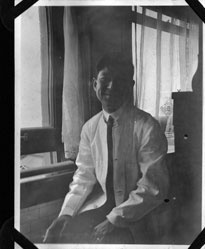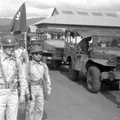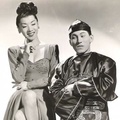Read part 1 >>
The Army
By 1943 many of the men in the camp had already volunteered or had been drafted to serve as replacements in the 100th Infantry Battalion/442nd Regimental Combat Team. Maeda was drafted into the U.S. Army just as the family was relocating to St. Paul, and was granted a ninety-day extension to help the family resettle.
The family lived for a year in a rooming house near Hamline University. Toshishige quickly reestablished himself as a skilled dental technician and his income made it possible to buy a house near Fairview and Iglehart in St. Paul in 1945. It remains in the family with a granddaughter to this day.
Maeda reported to the in-processing station Fort Logan, Colorado, where he was given a more thorough physical. He said the Army discovered that his body had permanent damage resulting from an accident he had at age six. He said a laundry truck had back up and struck him and his parents on a crosswalk.
Doctors thought Maeda might not survive the resulting concussion and internal injuries. When he pulled through doctors used tension mounts to pull his broken hip bones into place. He said the Army doctors determined that the injury did not heal well enough to endure military service and awarded him an honorable medical discharge.
“I was disappointed,” he said. “All the people were in the service and here I was walking around. Mom was relieved. This was before the end of the Pacific War.”
Early years in Minnesota
Maeda had some interesting jobs as a young man. His first in 1945 was with Booth Cold Storage on Kellogg and St. Peter in downtown St. Paul. It involved moving large cartons into refrigerated railroad boxcars to ship around the country.
“I worked there for about two weeks,” he said. “I wasn’t strong enough to lift the heavy cartons stacked up in the cars.”
From there Maeda went to work for Cudahy’s in Newport, across from Armour & Swift on the South St. Paul side of the Mississippi river. Together with Mexican and African American workers he worked below the meat cutting room covering hides with rock salt and shaking them clean to ship off to leather makers.
“I’d come home smelling like crap you know,” he said. “I didn’t last there.”
He enjoyed the next job as a floor worker at Goodyear Tire on 4th and Washington Street in downtown St. Paul. He was one of four Japanese American teens that worked for Mr. Deindorfer, a manager he described as a very good man from Ohio.
When Deindorfer was recalled to Ohio, Maeda said the replacement manager let the Japanese workers know right away he did not care for them and concocted an excuse about customer complaints to let them all go the same day. They went over to Rosen Tire and U.S. Oil, where they were hired on the spot by their former foreman at Goodyear to do the same job at the Jewish owned business.
Becoming a dental technician
Maeda was content changing tires, however, his aunt encouraged him to learn a trade since he hadn’t graduated from high school. It would be the only way to advance out of dead end jobs and into a skilled position.
His father, Toshishige, was working at the time for Dr. Irwin Epstein, and he became acquainted with the other dentists in the Lowry Medical Arts building. Two dentists, Drs. Garvey and Branstad referred Don to their own dental technician, Ed Carlson, who agreed to train him as a dental technician.
Maeda started with entry-level “scut work” and slowly learned the trade over nine years. When Carlson started his own shop in the Medical Arts building he took Maeda there with him.
“He and I basically opened this lab and eventually expanded the lab over time to twenty-five staff,” he said. “We ran a pretty good lab over time and because I was with him so long I was his right hand man and when he was gone I kind of managed the place. He treated me well and paid me well.”
* This article was originally published in the Asian American Press on June 12, 2011
© 2011 Asian American Press






